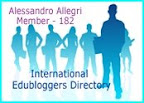As I wrote in a previous post, I decided to experiment using didactically a wiki with my four 14-16ers classes.
This experience, that's proceeding with some labour but, for now, in a satisfactory way, is teaching me a lot. First of all it teaches me that a wiki is just a tool. Finding colleagues who are so fond of technology in education that they miss its goal, is easy today. So, a wiki is a tool serving didactics, let me write it down clearly so I won't forget even if right now I adore wikis.
This, to me, means that, more than its practical usage (that has still some educational values in a school environment), its worth is the side-work. Preparing texts and materials, building the conceptual network, organizing the work, timeliness, accuracy: these are, in my opinion, aspects that must get through in a wiki-related project, perhaps even as assessment indicators for the completed project.
If our idea is to help our students to learn how to learn (repetition is on purpose), we would do well if we provide them with methods, in order to lead them without doing the work for them. For this I think that a good organization of a wiki-related project is necessary: so students can take advantage of the wiki both in learning the subject-theme the wiki is about, and also, and especially, in reflecting on the methods and tools of technologically assisted collaborative learning.
Publishing a wiki is not the end of the project. The "dry-run" publication phase must lead to improvement of the finished product, before its possible "www" publication. So all students must explore the conceptual network represented in the wiki, be able to intervene improving and augmenting the contents already present or suggesting options to their authors for more radical changes, which, in turn, the authors must be able to accept or refuse giving reasons.
Commenting on a post of hers, I asked Talia to suggest how one can assess e-learning in the classroom. I don't want to be lazy, so I'll try to give my contribution, in spite of my confused feelings and not being an expert in the field. I think I can safely say that a wiki per se is un-assessable, in the sense that it is a collective product and it's impossible to partially assess individual contributions. What can we assess, though?
- in the initial phase (pre-wiki): participation, quality and quantity of information found, timeliness, respecting tasks...
- in the publication phase: care of contents and of links
- in the final phase (post-wiki): the level of interaction and understanding shown in discussions about possible variants and corrections, the depth of the methodology and meta-subject reflection about the work done
- in the summative phase (extra-wiki): specific learning of the subject-theme as shown in a suitable classwork.
Of these four phases, the first two seem open to self-assessment by students, or peer-assessment, while the last two are more traditional and require expert and competent eyes of the teacher. The way to organize self-assessment or peer-assessment can depend, in my opinion, on the age and maturity of the students. It can be an anonymous matrix where each student marks his/her own and his/her mates' behaviour relatively to the indicators, or a grading list. One must pay attention that the assessment is specific, maybe even giving reasons, about the project and regarding only aspects contained in the indicators. For this, it can be limited to a self-assessment and to an assessment of mates belonging to the same work group.
I think that in a collaborative activity such as this, it's useful that
- not only contents are assessed
- not only the teacher assesses
I find it's even more useful for a teacher to experiment, be it only once, on an activity whose analysis and assessment levels are necessarily so complex. It motivates, it helps to refocus one's objectives and expectations, it opens one's mind, it forces reflection. In a word, it's healthy.
 Italian version
Italian version





2 comments:
What you've said about not being able to use wikis as assessment is SO true. But it's great that you've added ways that you can still use the wiki process in assessing.
Thanks for your insight!
Hey,
I wrote a post on assessment in eLearning, like you suggested! Hope you enjoy it. :-)
http://teachingtalia.com/2008/04/assessment-in-elearning/
Post a Comment